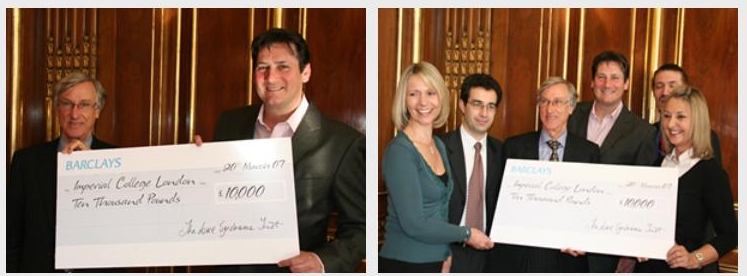Lowe Syndrome Trust extend CBC researchers funding

Lowe Syndrome Trust
On the 20th March 2007, Tony Hadley, Patron of the Lowe Syndrome Trust presented a cheque for £10,000 to fellow patron Sir Richard Sykes, Rector of Imperial College London.
On the 20th March 2007, Tony Hadley, Patron of the Lowe Syndrome Trust presented a cheque for £10,000 to fellow patron Sir Richard Sykes, Rector of Imperial College London. The money is a continuation of the grant that was awarded to two Chemical Biology Centre Scientists, Ramon Vilar and Rudiger Woscholski in 2003 to undertake research into this rare genetic disorder. The CBC has added to the money donated by the Lowe Trust by awarding a further grant of £87,000 which will fund a PhD student to work in this area. The funds for this studentship come from the CBC Doctoral Training Centre which was awarded by the EPSRC in 2003.
 |
Lowe Syndrome is a rate incurable disorder that affects only boys and produces congenital cataracts in the lens of both eyes, muscle weakness, weak bones, Kidney and brain development problems, which explains the short life expectancy. The disease was first recognised in 1952 by Dr Charles Lowe and is caused by a gene mutation which makes a defective version of an enzyme named OCRL1, which is needed for normal function of tissues like the lens, brain and kidney, although the reasons for this are still unclear.
The Lowe Syndrome Trust (LST) was set by Lorraine Thomas as a voluntary charity in June 2000 when her son, Oscar (then aged 5) was diagnosed with the disease. The Trust supports researchers worldwide in their efforts to gain knowledge and tools to tackle this devastating disease.
In 2003, the LST awarded Drs Woscholski and Vilar of the Chemical Biology Centre a studentship in order to develop chemical tools for the detection of the substrates of the OCRL1 enzyme. This work has generated chemical compounds that are able to recognise the OCRL1 substrate with some selectivity in conditions that mimic the cellular environment.
Drs Woscholski and Vilar have continued to work on the characterisation of these new compounds in living cells through funds received from the CBC DTC. Together with the funding provided by the LST, they will be able to study the suitability of the receptors towards generating chemical tools for biomedical research and which may even provide the foundations for a future drug development programme to tackle the symptoms of Lowe Syndrome.
Mrs Thomas, chair of the Trust says" We were devastated when Oscar was diagnosed with the syndrome at the age of 5. All the children are partially sighted or blind due to cataracts and some never ever walk. Even Lowe children (boys only) who are doing quite well with the disease, sadly deteriorate with the condition and most die in their teens. I am so grateful for the research being carried out by Drs Woscholski and Vilar and their teams at Imperial College and hope that all LST supported research will attract the attention of other funding bodies. Thus aiding us in our aim to raise awareness and funding for research projects that will one day lead to treatments and some increased hope for these boys.
For more information on the disease please visit http://www.lowetrust.com.
Article text (excluding photos or graphics) © Imperial College London.
Photos and graphics subject to third party copyright used with permission or © Imperial College London.
Reporter
Press Office
Communications and Public Affairs
- Email: press.office@imperial.ac.uk
